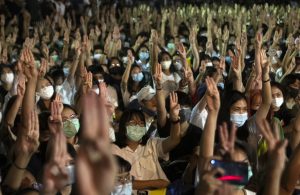As anti-government protests continue across Thailand, some student activists were recently accused of crossing a line by directly challenging the country’s powerful monarchy in a demonstration at Thammasat University’s Rangsit campus. This is not the first time Thammasat has been at the forefront of political upheaval in Thailand, and the memory of a dark day in 1976 serves as an ominous cloud over the activists who are daring to touch a topic long considered to be taboo.
This year’s anti-government protests began after the Constitutional Court of Thailand ordered the dissolution of the pro-democracy Future Forward Party in February, but soon fizzled out as large public gatherings were banned in response to the COVID-19 pandemic.
Tensions were heightened in early June with the disappearance of Wanchalearm Satsaksit, a prominent Thai pro-democracy activist. On June 4, Wanchalearm was abducted by armed men near his home in Phnom Penh, Cambodia, where he had been living in exile since 2014. He has not been seen since.
The latest spate of demonstrations broke out on July 18 when thousands gathered at Bangkok’s Democracy Monument to protest against the government of Prime Minister Prayut Chan-o-cha, a former army commander who has governed Thailand since leading a coup d’état in 2014. Organizers articulated three clear demands: the dissolution of parliament, an end to the punishment of government critics, and changes to the military-drafted constitution that protesters say rigged the deck in Prayut’s favor ahead of the 2019 elections.
Over the next several weeks, the demonstrations gained momentum. Student activists borrowed references from pop culture, adopting the three-fingered salute of defiance from the “Hunger Games” franchise and calling Thai government officials “Death Eaters,” a reference to the “Harry Potter” franchise. The ire of the student activists remained firmly focused on Prayut’s government and the persisting influence of the military over Thai politics.
That changed on the evening of August 10. At the Rangsit campus of Thammasat University, located 42 kilometers north of Bangkok, Panusaya Sithijirawattanakul, a 21-year-old student, stood on a stage and publicly questioned the monarchy. She laid out a 10-point manifesto calling for, among other things, a moderation of the monarchy’s use of public funds and an end to the lèse majesté law.
It is that very law that pro-royalists say Panusaya was openly defying when she called for reform of Thailand’s monarchy. The lèse majesté law, enshrined in the country’s criminal code and constitution, punishes anyone who is seen to defame or insult the royal family with prison sentences of three to 15 years. The law was last toughened in 1976, after an incident with striking similarities to this month’s demonstration at Thammasat.
On October 5 of that year, student activists at the Tha Phra Chan campus of Thammasat University, located in the heart of Bangkok, stood on a stage and performed a mock hanging. The student play was intended as a critique of the lynching of Chumporn Thummai and Wichai Ketsriphongsa, two pro-democracy activists who had been killed just weeks earlier. But accusations leveled by pro-royalists suggested the play actually featured the mock hanging of the crown prince, Maha Vajiralongkorn (now Thailand’s king).
The response was swift and brutal. On the evening of October 5, police and pro-royalist militias stormed the campus, engaging in a spree of beatings, sexual assaults, and lynchings. By the following afternoon, dozens were dead. Official reports claimed 46 dead and 167 wounded, but unofficial reports put the death toll at over 100. On the evening of October 6, the military launched a coup d’état, citing the student activists as a threat to the monarchy, returning Thailand to dictatorship after only three years of democracy.
This month’s demonstration has so far seen a more measured response from the government and pro-royalists. Prayut, the prime minister, has said authorities are looking to identify those involved in the protest, adding some may be arrested and punished under the lèse majesté law. Pro-royalists have staged their own protests in support of the monarchy.
Some activists have distanced themselves from the Thammasat manifesto, with the Free People group reaffirming its commitment to the three previously made demands for government reform.
But the Student Union of Thailand, whose leaders include Panusaya, the student who delivered the Thammasat manifesto on August 10, is remaining defiant. The group maintains that the demands expressed in the manifesto are in line with the Thai constitution and their political rights.
Thammasat is once again playing host to student activists addressing the most taboo of topics in a country that has long treated its monarchs as god-like figures. The military-backed government and pro-royalists have so far been restrained in their response to the latest challenge to the monarchy, but the dark memory of the 1976 Thammasat massacre serves as a horrific reminder of what may happen if the government and its backers are unwilling to address protesters’ demands.
Jake Black recently completed a master’s degree in international relations at the University of Melbourne, with a strong focus on the Asia-Pacific region.

































